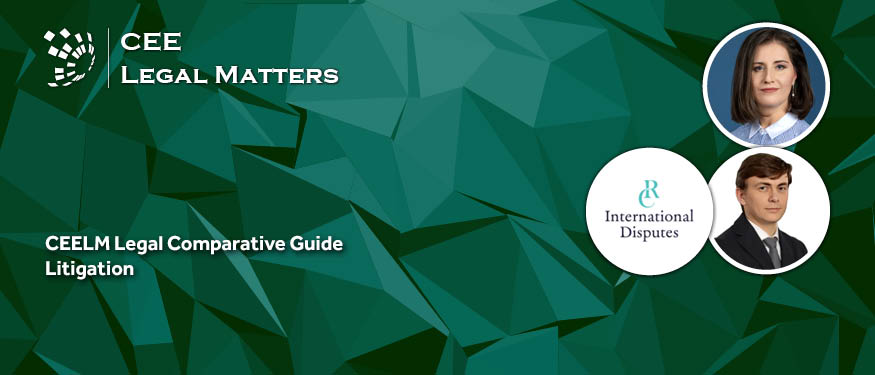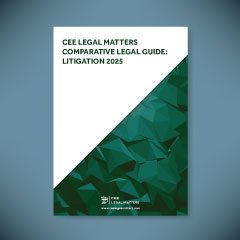Contributed by RC International Disputes.
1. General Trends
1.1. What is the current state of litigation in your jurisdiction, and what recent trends or developments have been observed?
The shortage of judges in the Romanian judicial system and the heavy caseload in some courts remain a challenge both within the judicial system and for the users of the system, with direct effects on the duration of the proceedings. On a positive note, access to the electronic file is increasingly available in more courts, as well as the electronic transmission of documents.
1.2. What are the key legal frameworks that regulate litigation?
The key legal framework governing civil litigation in Romania is the Code of Civil Procedure, in force since February 15, 2013.
2. Jurisdiction and Competence
2.1. How is the court system structured in your jurisdiction?
The Romanian civil court system is organized hierarchically: Courts of first instance, Tribunals, Courts of Appeal, and the High Court of Cassation and Justice.
The law sets the criteria for determining the competence of the courts based on the nature of the claims, the amount in dispute, and the geographical localization of the parties. As a general rule, the disputes settled in the first instance will be heard in appeal on the following level of the hierarchy, and in a final appeal on the next level.
For example, a claim starting before the Court of first instance will have its appeal before the Tribunal and its final appeal before the Court of Appeal, while a claim starting before the Tribunal will be appealed before the Court of Appeal, with a final appeal before the High Court of Cassation and Justice.
2.2. Are there specialized courts for specific types of litigation?
There are specialized divisions within the courts for disputes pertaining to relations between professionals, labor law, administrative and tax law, insolvency, family and minors, and intellectual propriety law.
2.3. How is jurisdiction determined in cross-border litigation, especially in cases involving foreign parties or multiple jurisdictions?
For cross-border disputes that are not covered by EU law or international treaties to which Romania is a party, the Code of Civil Procedure regulates the criteria for determining the jurisdiction. The main criterion is the defendant’s domicile or registered office.
Romanian courts are exclusively competent to judge disputes with foreign elements in the field of personal status relating to: civil status documents drawn up in Romania concerning persons domiciled in Romania and who are Romanian citizens or stateless persons; approval of adoption, if the person to be adopted resides in Romania and is a Romanian citizen or stateless person; guardianship and curatorship for the protection of a person domiciled in Romania, who is a Romanian citizen or stateless person; placing under judicial interdiction a person domiciled in Romania; dissolution, nullity or annulment of marriage, as well as other disputes between spouses, except those relating to real estate located abroad, if at the date of filing the application both spouses reside in Romania and one of them is a Romanian citizen or stateless person.
Romanian courts are also exclusively competent to judge disputes with foreign elements relating to: real estate located on the territory of Romania; goods left in Romania by the deceased with the last domicile in Romania; contracts concluded with consumers having their domicile or habitual residence in Romania, for current consumer services intended for the personal or family use of the consumer and unrelated to his professional or commercial activity, if: (a) the supplier received the order in Romania; (b) the conclusion of the contract was preceded in Romania by an offer or advertising and the consumer completed the necessary documents for the conclusion of the contract.
As a general rule in cross-border commercial litigation, Romanian courts have jurisdiction if the defendant has the registered office, even a secondary office, on the territory of Romania on the date of submission of the claim.
Choice of court agreements is recognized in matters concerning rights that the parties can freely dispose of according to Romanian law. For the matters listed above as falling under the exclusive competence of Romanian courts, a choice of court agreement is void.
3. Initiating Litigation
3.1. What are the primary steps required to initiate litigation in your jurisdiction?
Litigation is initiated by the submission of the claim with the competent court. The second step is the written procedure between the court and the claimant. At this stage, the court checks the compliance of the claim with all the mandatory requirements. An exchange of correspondence may take place between the court and the claimant to ensure that the claim fulfills all formal conditions. As a third step, the court serves the claim to the defendant. As a fourth step, the defendant submits its statement of defense. Claimant further submits a reply to the statement of defense. Finally, the court sets the date for the first hearing.
3.2. Are there any specific requirements for parties regarding pre-litigation procedures?
There are specific areas provided by law when pre-litigation procedures are mandatory and proof of completion of the pre-litigation procedure must be attached to the statement of claim. For example, the preliminary procedure in administrative litigation or the preliminary notice to be fulfilled before requesting a payment order. Moreover, parties may contractually agree on pre-litigation procedures, like negotiation or mediation.
4. Timelines
4.1. What are the typical timelines for different stages of litigation, from initiation to resolution?
From initiation to resolution, a civil claim generally goes through the following stages:
(i) Claimant submits the statement of claim before the court – initiation of the proceedings;
(ii) The court verifies the fulfillment of the formal requirements of the claim. If any essential formal requirements are not fulfilled, the court notifies the claimant to amend its claim within 10 days. Failing to comply may lead to the dismissal of the claim. Nevertheless, such dismissal does not have a res judicata effect – a new statement of claim can be submitted within the limitation period;
(iii) The court serves the statement of claim to the defendant;
(iv) Defendant must submit a statement of defense and, if the case, a counterclaim within 25 days of the communication of the claim. Failure to submit a statement of defense in time may lead to the loss of the opportunity to propose evidence or invoke objections regarding the claim, with the exception of the ones concerning public order;
(v) The court serves the statement of defense to the claimant;
(vi) The claimant must submit an answer to the statement of defense within 10 days of the communication of the statement of defense;
(vii)Considering the caseload of the instance, the court sets the date of the first hearing usually after the submission of the answer to the statement of defense;
(viii)At the first hearing, if there are no grounds for deferment, there is a debate on the evidence proposed by the parties, its relevance, and pertinence to the dispute. The court decides what evidence will be administered in the proceedings and the steps and dates for its administration, for instance, when will witnesses be heard or expert reports submitted;
(ix)After all evidence was administered before the court, there is a final hearing, when the parties argue their case on the merits before the court;
(x)After the final hearing, parties may submit post-hearing briefs within a deadline set by the judge;
(xi) The court renders its decision at the end of the day when the final hearing takes place or may defer it for a later date. The detailed reasons for the decision should be drafted and served within 30 days from the date of the decision.
4.2. Are there specific time limits for filing claims, and do these vary depending on the type of dispute?
The general limitation period in Romania for pecuniary civil claims is three years.
For specific types of disputes, some different limitation periods may apply. For example, for property claims, the limitation period is ten years, while for insurance and reinsurance claims, the limitation period is two years. Moreover, the claim for partition of certain goods jointly held by more owners is not subject to a time limit.
The limitation period may be suspended or interrupted in the conditions prescribed by law. Moreover, parties may contractually agree on the moment when the limitation starts to run, the suspension of the limitation, or the duration.
5. Interim Measures
5.1. What interim remedies are available in your jurisdiction?
Generally, interim remedies granted by Romanian courts are aimed at preventing the defendant from disposing of his assets or at preserving the claimant’s rights until a final judgment is rendered.
Among the interim remedies that Romanian courts can grant the most common are the freezing of immovable assets, the freezing of bank accounts, and the suspension of the effects of an administrative act until the court will rule on the validity of such act.
5.2. Under what circumstances can a party obtain an interim injunction, and how quickly can such relief be granted?
As general requirements for obtaining an interim injunction, the requesting party must show that:
- the proceedings on the merits of the case have already been initiated or the request fits the hypotheses expressly provided by the law allowing interim relief prior to the initiation of the proceedings;
- there is a risk of irreparable damage until a final decision on the case is provided;
- there is urgency for the interim injunction to be granted;
- there is at least an appearance that the claim is well-founded at an initial analysis of the case.
Specific interim injunctions may require fulfillment of further admissibility conditions.
Generally, a security deposit must be provided in the amount set by the court within the limits provided by law, which can vary up to 20% of the claim.
Depending on the court and its caseload, an interim relief is granted typically in two to five weeks. An appeal can add some further two to four weeks.
6. Discovery
6.1. What are the rules governing the discovery process in your jurisdiction?
Under Romanian law, there is no discovery procedure as known in common law jurisdictions.
However, as a general procedural rule, the statement of claims and the statement of defense should disclose all types of evidence the parties intend to use during the trial.
Also, the judge may, either at the request of a party or ex officio, order the parties to the dispute or third parties, including public authorities and institutions, to submit before the court any other evidence that the court deems necessary.
For instance, if one of the parties informs the court that an opposing party holds a relevant document, the court will order the production of such document if it is a document belonging to both parties, if the party that holds it made reference to it or if the party has a legal obligation to submit it.
The court will reject the request to produce a document when the content of the document refers to strictly personal matters regarding the dignity or private life of a person; producing the document would violate the legal duty of confidentiality or would result in criminal prosecution of the party, the spouse or a relative up to the third degree.
Moreover, public authorities and institutions have a right to refuse the submission of documents related to national defense, public safety, or diplomatic relations.
6.2. What types of evidence can be requested, and how are discovery disputes resolved?
Generally, the requested evidence covers documents, witnesses, and expert reports. Material evidence can also be requested, including photographs, photocopies, films, discs, sound recording tapes, as well as other such technical means, if they were not obtained by violating the law or good morals.
Witnesses must be previously admitted by the court and presented directly in front of the judge for questioning, and expert witnesses must be appointed by the court, usually by random drawing from a list of experts. Any written evidence from witnesses and experts not appointed by the court will only count as documents, not as witness statements or expert reports.
6.3. How is evidence presented and evaluated during litigation?
Evidence is generally submitted (e.g., documents) or requested (e.g., witnesses, experts) together with the first round of written submission, statement of claim, and statement of defense. The court decides which piece of evidence is admissible and relevant to the dispute.
All documents submitted by the parties must be in certified copies. The court may request the parties to present the original of a specific document when it deems it appropriate.
The witness statement is given orally before the judge. The parties and the judge address questions to the witness. The answers to these questions and the statement are written down by the court clerk and signed by the witness. The document thus drafted is attached to the file as a witness statement.
The expert submits an expert report to the file and may be called before the court for an oral statement and to answer questions.
There also exists the possibility that the administering of evidence is conducted between lawyers without the participation of the court, within a deadline set in this respect by the court. In practice, this procedure is very rarely used.
7. Enforcement of Judgments
7.1. What types of judgments can be issued in civil litigation, and how are they enforced?
A civil judgment can be final and enforceable or just enforceable and subject to appeal.
Any final or otherwise enforceable judgment can be enforced with the assistance of an enforcement officer when the debtor refuses to comply with its terms.
7.2. Are there specific provisions for cross-border litigation or enforcement of foreign judgments?
For cross-border disputes that are not covered by EU law or international treaties to which Romania is a party, the Code of Civil Procedure regulates the criteria for determining the jurisdiction, the law applicable in cross-border litigation, as well as the requirements for the recognition and enforcement of foreign judgments.
If the judgment is issued by an EU Member State, its enforcement in Romania is governed by Regulation (EU) No 1215/2012 of the European Parliament and of the Council of December 12, 2012, on jurisdiction and the recognition and enforcement of judgments in civil and commercial matters (recast). No exequatur or a formal declaration of enforceability is required, a judgment from another EU Member State is to be enforced in Romania under equivalent conditions to a judgment issued by Romanian courts, provided that some conditions regarding the judgment itself are complied with by the requesting party.
If the judgment is issued by Iceland, Norway, or Switzerland, its enforcement in Romania is governed by the 2007 Lugano Convention on jurisdiction and the recognition and enforcement of judgments in civil and commercial matters (2007 Lugano Convention).
Other foreign judgments will be governed by the specific provisions in the Code of Civil Procedure unless there are any other bilateral or multilateral international treaties in place to which Romania is a party.
Romania is a party to The Hague Convention of June 30, 2005, on Choice of Court Agreements (2005 Hague Convention), which entered into force in 2015. Romania is also a contracting party to the Hague Convention of July 2, 2019, on the Recognition and Enforcement of Foreign Judgments in Civil or Commercial Matters (2019 Hague Convention).
8. Appeal
8.1. What is the appeals process, and what are the grounds for appeal in your jurisdiction?
All judgments issued in the first court can be appealed unless otherwise expressly provided by the law. The appeal against the first court’s judgment must be submitted within 30 days from the notification of the judgment. The appeal will be judged by the superior court and generally allows the reconsideration of the case, both on the merits and on the facts.
A second appeal (recourse) is also generally available against a judgment issued in appeal, except when expressly prohibited by the law. The second appeal is limited to breaches of legal principles or procedural rules expressly determined by the law. The second appeal will be judged by the superior court.
The grounds for filing a second appeal are expressly provided by law and failure to fit in one of these grounds results in the annulment of the second appeal. Such grounds include:
- if the court was not constituted in accordance with the legal provisions;
- if the decision was pronounced by a judge other than the one who took part in the debate on the merits of the trial or by a panel other than the one randomly established for the resolution of the case or whose composition was changed, in violation of the law;
- if the decision was given in violation of the public order competence of another court, invoked under the terms of the law;
- if the court exceeded the powers of the judiciary;
- when, by giving the decision, the court violated the rules of procedure, the non-compliance of which entails the sanction of nullity;
- when the decision does not include the reasons on which it is based or when it includes contradictory reasons or only reasons unrelated to the nature of the case;
- when the authority of res judicata was violated;
- when the decision was given in violation or misapplication of substantive law.
These grounds for a second appeal will not be heard unless the party could not invoke them on appeal or during the appellate hearing or, although they were invoked within the time limit, were rejected or the court failed to rule on them.
9. Costs and Funding
9.1. How are legal costs determined, and what are the common practices regarding funding litigation?
The legal costs include judicial stamp fees determined by law, according to the object and value of the claim, fees related to obtaining evidence (e.g., expert reports), and attorneys’ fees. As a general rule, court fees are paid by the claimant, fees related to the production of evidence are paid by the party that proposed the evidence, and both parties pay their respective attorneys’ fees.
In general, legal actions filed before the courts are subject to various judicial stamp fees, depending on whether their subject is financially determinable. Claims that are not financially determinable are stamped with a fixed stamp fee specified by law, according to the nature of the petition. The law also provides that certain legal actions are exempt from judicial stamp fees, such as those related to labor, social security, consumer protection, and criminal litigation. The Ministry of Public Finance also may grant exemptions if the requesting party proves that he lacks the funds to pay the stamp fee. There also is a specific procedure for requesting judicial aid, either as a reduction of the stamp fee or as payment in installments. The court awards the stamp fee as a judicial expense to the claimant if he prevails in the proceeding.
The general principle is that of reimbursement of costs to the prevailing party. Therefore, the losing party shall be ordered, at the request of the winning party, to pay the latter’s legal costs. When the claim has been accepted only in part, the judge shall determine the extent to which each party may be ordered to pay the legal costs. If necessary, the judges may order the compensation of legal costs. Considering that the attorneys’ success fee is paid after the final resolution, this kind of fee is not reimbursed by the court.
If the claim of one of the parties is fully accepted, the court can only reduce the amount payable by the losing party for the successful party’s attorneys’ fees when they are considered disproportionate to the complexity and the value of the case.
To ease the funding of the attorneys’ fees, parties may opt for concluding legal assistance contracts that combine fixed or hourly fees with success fees. Nevertheless, such agreements must not become pactum de quota litis which is legally forbidden between attorneys and clients in Romania. Pactum de quota litis is defined as an agreement concluded between an attorney and his client before the final settlement of a case, that exclusively sets the totality of the attorneys’ fees depending on the judicial outcome of the case, regardless of whether these fees consist of a sum of money, a good or any other value.
Another option to alleviate the burden of the costs is an insurance policy covering a party’s legal costs, as well as the opponent’s costs, in case the losing party will be ordered to pay them.
9.2. Are there alternative funding options available for parties involved in litigation?
Third-party funding is not expressly regulated in Romania. Therefore, third-party funding arrangements may be possible, but these arrangements must be carefully crafted in order to ensure compliance with collateral regulations.
10. International Treaties
10.1. How do international treaties or regional agreements impact litigation in your jurisdiction?
Correlated with their scope, the impact of international treaties and regional agreements is prevalent in matters of jurisdiction, applicable law, recognition, and enforcement of judgments, as well as service of documents and taking of evidence. Moreover, several EU Regulations impact litigations with their streamlined procedure regarding the European Enforcement Order for Uncontested Claims, European Order for Payment Procedure, and European Small Claims Procedure.
Foreign judgments falling under the scope of the EU Regulations are subject to the conditions set out in the Regulations and benefit from a streamlined recognition and enforcement procedure. Other foreign judgments may be recognized and enforced in Romania based on the domestic legal provisions enshrined in the Civil Procedural Code unless a relevant bilateral or multilateral treaty provides otherwise.
Romania is a contracting party to several bilateral and multilateral treaties and conventions on legal assistance in civil and commercial matters, a comprehensive list of which is published on the official website of the Ministry of Foreign Affairs.
Such treaties also may comprise provisions regarding the recognition and enforcement of judgments originating from the contracting states or may be helpful in other respects during the recognition and enforcement proceedings (e.g., legalization of documents and burden of proof).
The main bilateral treaties in the field of recognition and enforcement of foreign judgments have been concluded with Albania, Algeria, Austria, Belgium, Bulgaria, North Korea, Czech Republic, China, Egypt, Hungary, Moldova, Poland, Russia, Serbia, Slovenia, Syria, Turkiye, and Ukraine.





